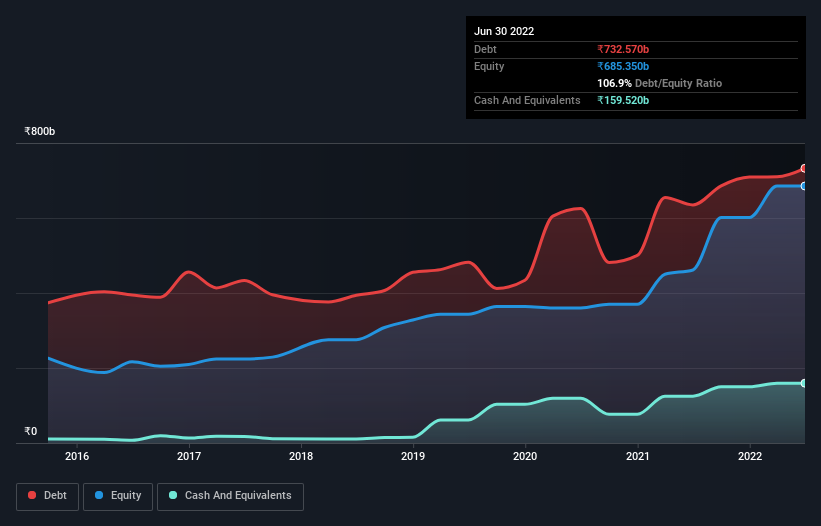
David Iben put it well when he said, 'Volatility is not a risk we care about. What we care about is avoiding the permanent loss of capital.' It's only natural to consider a company's balance sheet when you examine how risky it is, since debt is often involved when a business collapses. We can see that JSW Steel Limited (NSE:JSWSTEEL) does use debt in its business. But the more important question is: how much risk is that debt creating?
When Is Debt A Problem?
Debt is a tool to help businesses grow, but if a business is incapable of paying off its lenders, then it exists at their mercy. Part and parcel of capitalism is the process of 'creative destruction' where failed businesses are mercilessly liquidated by their bankers. However, a more common (but still painful) scenario is that it has to raise new equity capital at a low price, thus permanently diluting shareholders. By replacing dilution, though, debt can be an extremely good tool for businesses that need capital to invest in growth at high rates of return. The first step when considering a company's debt levels is to consider its cash and debt together.
View our latest analysis for JSW Steel
How Much Debt Does JSW Steel Carry?
The image below, which you can click on for greater detail, shows that at March 2022 JSW Steel had debt of ₹732.6b, up from ₹634.9b in one year. On the flip side, it has ₹159.5b in cash leading to net debt of about ₹573.1b.

How Healthy Is JSW Steel's Balance Sheet?
According to the last reported balance sheet, JSW Steel had liabilities of ₹575.5b due within 12 months, and liabilities of ₹704.0b due beyond 12 months. On the other hand, it had cash of ₹159.5b and ₹114.5b worth of receivables due within a year. So it has liabilities totalling ₹1.01t more than its cash and near-term receivables, combined.
This deficit is considerable relative to its very significant market capitalization of ₹1.48t, so it does suggest shareholders should keep an eye on JSW Steel's use of debt. Should its lenders demand that it shore up the balance sheet, shareholders would likely face severe dilution.
We use two main ratios to inform us about debt levels relative to earnings. The first is net debt divided by earnings before interest, tax, depreciation, and amortization (EBITDA), while the second is how many times its earnings before interest and tax (EBIT) covers its interest expense (or its interest cover, for short). Thus we consider debt relative to earnings both with and without depreciation and amortization expenses.
JSW Steel's net debt is sitting at a very reasonable 1.7 times its EBITDA, while its EBIT covered its interest expense just 6.1 times last year. While that doesn't worry us too much, it does suggest the interest payments are somewhat of a burden. One way JSW Steel could vanquish its debt would be if it stops borrowing more but continues to grow EBIT at around 12%, as it did over the last year. There's no doubt that we learn most about debt from the balance sheet. But ultimately the future profitability of the business will decide if JSW Steel can strengthen its balance sheet over time. So if you want to see what the professionals think, you might find this free report on analyst profit forecasts to be interesting.
Finally, while the tax-man may adore accounting profits, lenders only accept cold hard cash. So the logical step is to look at the proportion of that EBIT that is matched by actual free cash flow. Looking at the most recent three years, JSW Steel recorded free cash flow of 46% of its EBIT, which is weaker than we'd expect. That weak cash conversion makes it more difficult to handle indebtedness.
Our View
While JSW Steel's level of total liabilities does give us pause, its EBIT growth rate and interest cover suggest it can stay on top of its debt load. Looking at all the angles mentioned above, it does seem to us that JSW Steel is a somewhat risky investment as a result of its debt. That's not necessarily a bad thing, since leverage can boost returns on equity, but it is something to be aware of. There's no doubt that we learn most about debt from the balance sheet. However, not all investment risk resides within the balance sheet - far from it. Case in point: We've spotted 3 warning signs for JSW Steel you should be aware of.
If, after all that, you're more interested in a fast growing company with a rock-solid balance sheet, then check out our list of net cash growth stocks without delay.
New: Manage All Your Stock Portfolios in One Place
We've created the ultimate portfolio companion for stock investors, and it's free.
• Connect an unlimited number of Portfolios and see your total in one currency
• Be alerted to new Warning Signs or Risks via email or mobile
• Track the Fair Value of your stocks
Have feedback on this article? Concerned about the content? Get in touch with us directly. Alternatively, email editorial-team (at) simplywallst.com.
This article by Simply Wall St is general in nature. We provide commentary based on historical data and analyst forecasts only using an unbiased methodology and our articles are not intended to be financial advice. It does not constitute a recommendation to buy or sell any stock, and does not take account of your objectives, or your financial situation. We aim to bring you long-term focused analysis driven by fundamental data. Note that our analysis may not factor in the latest price-sensitive company announcements or qualitative material. Simply Wall St has no position in any stocks mentioned.
About NSEI:JSWSTEEL
JSW Steel
Engages in the manufacture and sale of iron and steel products in India and internationally.
Reasonable growth potential second-rate dividend payer.
Similar Companies
Market Insights
Community Narratives



